By Patara Williams
Your syllabus says, “Semester Long Project,” but of course, you were at the top of your class in high school and no assignment has ever taken you more than a few hours, even projects.
Do away with that thought.
Seriously.
College is the time to do away with procrastination, because if you still suffer from it, then it will inevitably sneak its way into your postgrad life. Don’t let it do that.
Like me, you’ll find yourself busy from sun up to sun down, only to have enough leisure time to watch Scandal once a week. Projects won’t become priorities until the deadlines approach. Deadlines are surreptitious and not to be tested (no pun intended).
Inevitably, you’ll start your project less than a week before it’s due, two days for some of you, and then the incessant questions will rush in.
Does Professor X mean like this or like that?
Do I use APA or MLA?
What the heck is APA?
How long should my literature review be?
Don’t let it get this far. Begin your semester long projects, portfolios, research papers, etc. with ample time so you can sit down with your professor during office hours and get an idea of what he or she is looking for. Do this, and:
- Your professor will be impressed
- You will have more insight than your counterparts
- Your project will be stellar
- And even if it’s not, you just got 100 cool points from Professor X for not procrastinating
Let’s just say you do indeed choose to wait.
The questions will go unanswered because you’ll feel too embarrassed to email or ask your teacher questions about a project that you have yet to start, less than 72 hours before it’s due.
Instead, glean wisdom my friends:
Procrastination is an A’s kryptonite.
Timeliness is the antidote.
Sic your semester projects!


![image[1]](https://blogs.baylor.edu/admissions1/files/2013/12/image1-1oncsah-300x198.jpeg)


